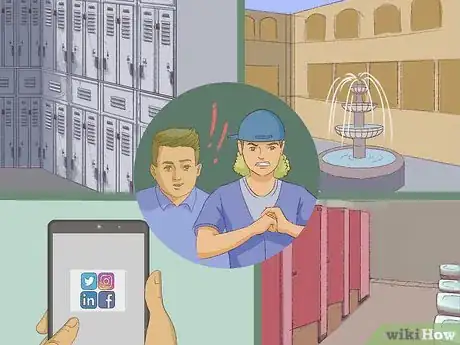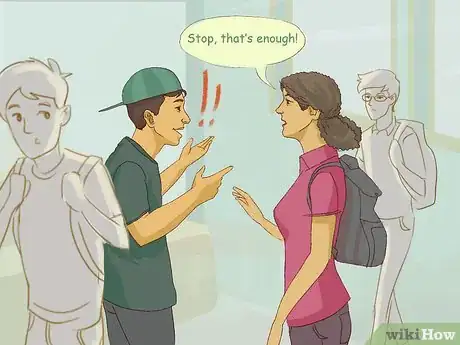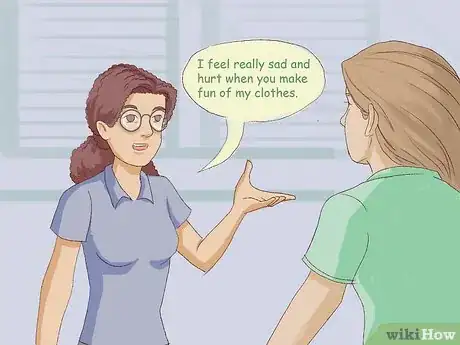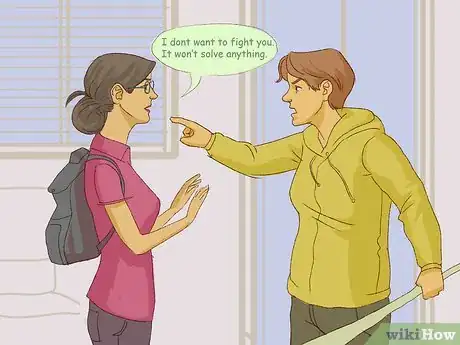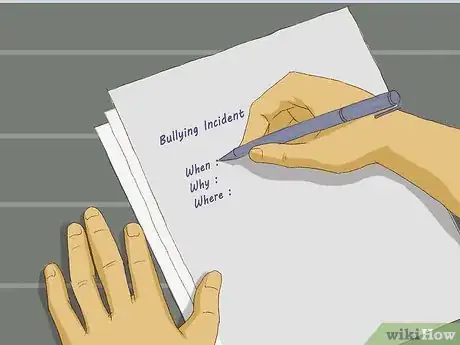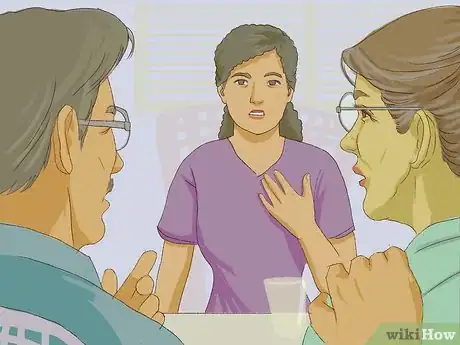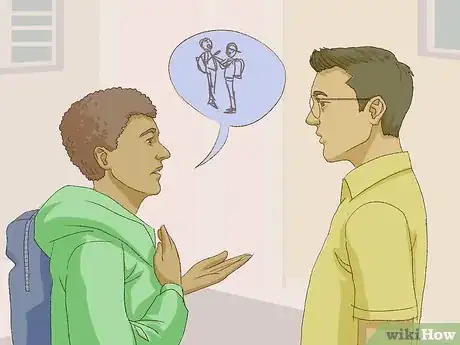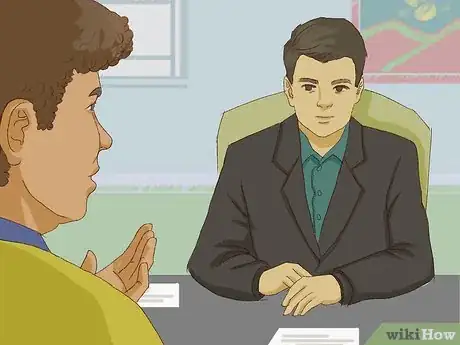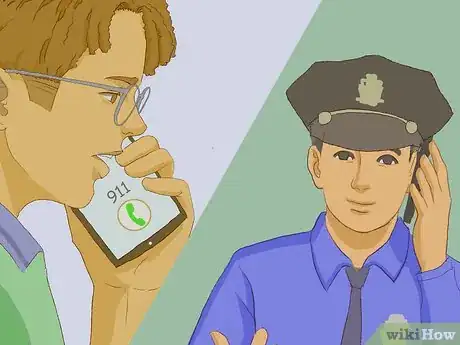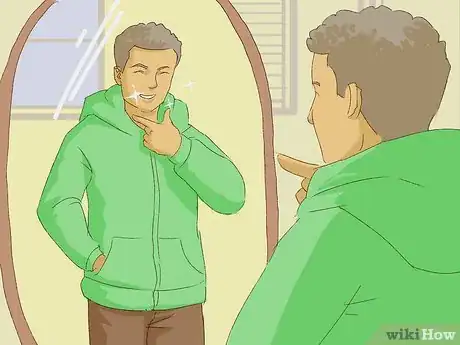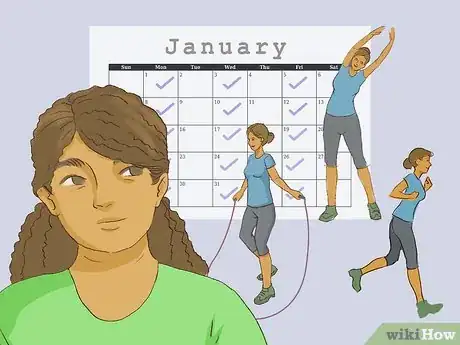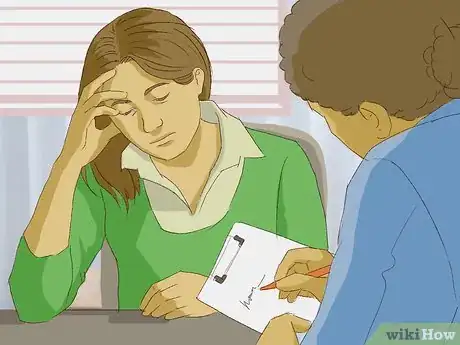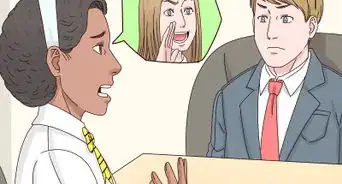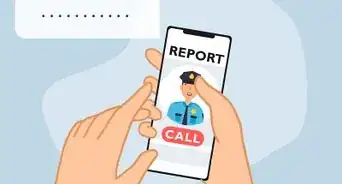This article was co-authored by Cameron Gibson, R.C.C.. Cameron Gibson is a Registered Clinical Counsellor in Vancouver, British Columbia. Cameron specializes in working with men to support their struggles with anxiety, depression, trauma, OCD, and developmental disabilities. He holds a BA in Psychology from Carleton University and an MA in Counseling Psychology from the City University of Seattle. Cameron is also the Program Director for Manifest Wellness, a men's mental health clinic, where he works to destigmatize mental health support for men and increase access to counseling.
This article has been viewed 36,163 times.
Bullying is a serious problem that’s unfortunately all-too-common in middle and high school. Nobody deserves to be bullied. If you’re the target of bullying, you might feel powerless, scared, embarrassed, or even depressed. But you don’t have to let people who bully get you down. Experts have been studying bullying for decades now, and there many proven strategies that can help you. There are strategies you can learn to make interacting with bullies easier, people you can go to for help, and techniques you can use to build your self-confidence. Having to deal with bullies is a challenging experience, but you can use this experience to make yourself into a stronger person.
Steps
Avoiding Bullying Encounters
-
1Stay away from places where bullying frequently happens. Identify the locations in your school and neighborhood where bullying typically occurs. Try to change your daily routine to avoid this areas as much as possible. While you cannot completely avoid people who bully, limiting your interactions with them will help you avoid becoming a target.[1]
- Common places where bullying happens include: nearby certain lockers, in bathrooms, or around water fountains.
- To stop being bullied online, you can apply a similar principle of avoidance. If you receive bullying messages, turn off your device immediately. When you turn your device back on, block whoever is bullying you.[2]
-
2Travel in groups to protect yourself from bullying. Bullying tends to happen when individuals are alone. If you know that you’re likely to cross paths with someone who is bullying you, ask a friend or group of friends to walk with you.[3]
- You might want to consider having a friend walk with you to school.
- Or you can ask a friend to meet you at your classroom when the bell rings, so you won’t have to walk the halls by yourself.
Advertisement -
3Ignore insults from people who bully. Ignoring rude comments isn’t easy--especially if you’re feeling upset, or others encourage you to respond. But remember you are never obligated to respond to someone who is bullying you.[4] In fact, ignoring insults shows that you’re strong and that you don’t let others control you.[5]
- You can act as if you didn’t hear the bullying comment at all. In this case, consider doing something else or turn to face another student to start a different conversation as if nothing had happened.
- Avoid trying to defend yourself if you’re experiencing verbal bullying. Even if you feel embarrassed and want to prove that they are wrong, a bullying encounter is not the best time to disprove them.
-
4Walk away when someone starts bullying you. If you can, walk away in a safe direction as soon as bullying begins. Try to move towards a classroom, office, business, or any location in which adults are present.[6]
- Walk away swiftly but with confidence--standing up straight with your chin up.[7]
- Try to get others to come with you. A simple, “let’s go” can signal to your friends that you’d like them to leave with you.
- If you are the frequently the target of bullying, develop a safety plan to help you remember the best escape route to take when things get tough. Write down the common places in which you experience bullying. then list the destination that you’ll walk to in order to escape the bullying.
Communicating With Whoever’s Bullying You
-
1Remain calm before addressing someone who’s bullying you. While you always have the option to ignore and walk away from a bully, you may instead choose to address bullying behavior directly.[8] Only take this approach if you can remain calm. Showing signs of hurt or anger will likely make the situation worse.[9]
- People bully others in order to get a reaction out of them. It’s a way of controlling other people. So you can think of remaining calm as a victory over bullying. It shows that you cannot be controlled.[10]
- If you need help staying calm, try counting to ten in your head or using deep-breathing techniques to remain calm.
-
2Make eye contact with whoever is bullying you. Before addressing someone who is bullying you, make sure that you are demonstrating confident body language. Turn to face whoever is doing the bullying. Stand tall and look them directly in the eyes before talking to them.
- Do not approach approach or get too close to the bully. You don’t want them to feel at all threatened or give them a reason to turn violent.
- You simply want to make sure they have your attention and that they sense that you’re not afraid to stand up for yourself.
-
3Tell whoever’s bullying you to stop in tense situations. The easiest and most effective way to communicate with someone who’s bullying you is to clearly and simply tell them to stop. Especially if there’s a crowd around, it’s often best to keep your words simple and to the point. #*Just say, “stop” or “that’s enough” and walk away.
- If you are nervous, consider practicing different responses with friends or family members.
-
4Considering sharing how you feel with whoever’s bullying you. If the person bullying you is someone you feel safe approaching in private, find a time to talk to them when they don’t have an audience. Approach them and tell them how their bullying is making you feel.[11]
- Use “I-statements” to focus on your feelings. Consider saying something like, “I feel really sad and hurt when you make fun of my clothes.”
- Avoid labeling them a bully or telling them that they have done something wrong. You don’t want to say, “It’s really rude of you to insult my clothes.”
- This approach can work well for a former friend or someone that you’re not afraid of talking to in more detail.
- You may want to bring someone else with you when approaching whoever has been bullying.
- Never approach someone who is bullying in private if you think things might get violent.
-
5Use humor and positivity to undermine attempts at bullying. If you feel comfortable, you can try to defuse bullying encounters with a joke or light-hearted statement. Whoever’s bullying you wants to make you embarrassed or upset in front of others. If you keep a positive tone, sometimes people who bully will back down.[12]
- If someone insults you, you can try just laughing it off.
- For example, if someone insults your shoes, you might respond by saying, “Wow, I’m sorry you don’t like them. I wear them all the all time.” In this case, you are responding to what they said but ignoring their negative intention.
- Never respond with insults and avoid sarcastic statements that could anger whoever’s bullying you. Try to keep your responses positive or neutral.
- If you’re experiencing bullying behavior regularly, you might want to try practicing your responses to their insults.
- But don’t feel pressure to respond to bullying. This approach doesn’t work for all situations, so remember that you always have the option to ignore bullying and walk away or to simply say, “stop” before walking away.
-
6State that you don’t want to fight if bullying turns violent. Preventing a bullying encounter from turning violent is the best way to protect yourself. If a fight breaks out, you can not only get hurt, but you may end up also getting in trouble.
- If a bully starts to get violent, say things like, “I don’t want to fight you. It won’t solve anything.” Or simply say, “fighting isn’t my thing.”
- Making your intention to avoid fighting known to everyone who’s around.
Getting Help from Others
-
1Document any instances of bullying. Write down everything the bully says and does in a notebook or journal. Documenting this information will help you remember all the details of what happened. This information will make it easier for adults and school officials to help you respond effectively.
- Make sure each description includes who was there, when it happened, what was said and done, and how everyone responded.
- You may also want to write down why you think you were the target of bullying--especially if you believe you were targeted because of your race, religion, or sexual orientation.
-
2Ask for advice from a family member or trusted adult. Always inform an adult when you’re being bullied. The adult can help you develop strategies for responding--such as finding someone to walk to school with or practicing calm and assertive responses. You should also discuss how to inform the school of what’s occurring.[13]
- It’s not recommended that parents deal directly with whoever’s bullying you or with their parents. When parents intervene in this way, it often makes the situation worse.
- Family members should support you in two ways--by providing you with advice on how to handle encounters and by calling the school to talk to an administrator such as the principal or school counselor.
- If you do not have an adult in your life that you trust, go immediately to a teacher, counselor, or school administrator.
-
3Tell a teacher about the bullying you’re experiencing. Most teachers have received some form of training about to intervene in bullying situations. A teacher can help offer you protection and find strategies to improve the situation.[14]
- You may want to start by talking to the teacher that you trust most.
- A good time to approach a teacher is before or after class.
- If other students are around, ask to schedule a time to meet with your teacher one-on-one. Say something like, “I’d like to speak with you about something serious. Can we schedule a time to meet?”
- If bullying is occuring in a classroom, you should talk to the teacher of that class.
- If bullying is happening at a particular location--such as by your locker--you may also consider involving a teacher who’s classroom is by that location.
-
4Make an appointment to talk with a school counselor or administrator. Schools have numerous resources and individuals who can help you deal with bullying. Either ask a teacher to help you get an appointment, have your parents call the office, or walk into your school office and ask for an appointment with either a counselor or principal.[15]
- If you are afraid for your physical safety or are feeling suicidal, this is a serious matter that needs immediate attention. Approach your school guidance counselor, nurse, or other administrator and say, “I need your help with something serious. Can we talk?”
-
5Reach out to friends and other students for support. The more people who are aware of the situation, the safer you will become. Let neighbors, friends, and other family members know what is occurring. These people can help keep you safe if you need somewhere to go or someone to talk to. Sharing stories with your peers can help you all feel stronger.
- Consider leading a campaign at school. Many schools have campaigns to fight bullying or are open to new ones. Talk to your guidance counselor or principal about getting involved.
-
6Make an anonymous call to an expert if you feel isolated and scared. If you can’t bring yourself to talk to someone you know, there are trained professionals who can help. Call a free, 24/7 hotline to talk to someone anonymously or send an anonymous email through a website.
- If you’re being bullied in the US, contact 988 by phone/text or visit https://www.stopbullying.gov/.
- If you live in the UK, contact 0808-800-222 or http://www.bullying.co.uk.
- In Australia, contact 1-800-55-1800 or http://www.kidshelp.com.au.
- In Canada, contact 800-668-6868 or http://www.kidshelpphone.ca.
- If you are an LGBT youth, contact the Trevor Project at 1-866-488-7386.
-
7Report severe bullying to the authorities if nothing else works. If you aren’t able to resolve the issue with the help of school authorities, it may be time to seek help from local authorities. You can report bullying to local law enforcement or outside groups that monitor certain cases of bullying.
- If you are in immediate danger, call for emergency help.
- If you’re not in immediate danger, call your local police station non-urgent number. Tell them briefly what has been happening and ask what information they will need and if you can meet with an officer to file a report.
- You learn more about your particular state’s laws and policies at https://www.stopbullying.gov/resources/laws.
- If you’re a victim of discriminatory bullying, contact groups such as the American Civil Liberties Union (ACLU), which can offer help.
Coping and Recovering from Bullying
-
1Understand that you’re not alone. Bullying can feel like a lonely experience. However, around 25 percent of kids experience bullying, so you're not alone in what you're going through.[10]
- Organizations such as PACER.org are also dedicated to connecting individuals who have been bullied.
- Even if you don’t feel comfortable getting involved in an organization, browse through their online materials. It will hopefully help you to feel more connected to others who have been in a similar situation.
-
2Remember that it’s not your fault. While a bully’s taunts can hurt and some things they say may even feel true, realize that you are not to blame for the bullying. People who bully are frustrated or discontented in their own lives and want to make you feel as badly as they do.[16]
-
3Work on your self-confidence. Even though it’s not your fault, being bullied can leave you feeling hurt. You need to counteract the negative things the bully is saying to you with positive messages.[17]
- Write your positive qualities on post-it notes and stick them around your room.
- Look in the mirror and compliment yourself. We tend to overemphasize our flaws rather than our positive features, so counteract this by focusing on the positive!
- Avoid negative self-talk. If thoughts like, “I am worthless” or “nobody likes me” come to mind, talk back to each negative thoughts with a positive and more realistic assessment: “No, that isn’t true. I am worthy. People do like me. Just because I’m being bullied doesn’t mean I am not a good person that deserves to be liked.”
- Hold your head high, stand with good posture, and smile.
-
4Treat yourself extra kindly if you’re being bullied. Recognize that periods of bullying are stressful, and you deserve to make extra time for yourself to do enjoyable things and relax. Schedule rewards for yourself in the morning before you go to school, when you get home in the afternoon, and on the weekend.
- Treat yourself to your favorite breakfast before school.
- Schedule an hour or so when you get home from school to do something relaxing--like playing a video game or painting--to take your mind off of bullying.
- Plan a spa day or go on a hike over the weekend.
-
5Create positive goals for yourself. While you shouldn't change yourself just because you're being bullied, you can use this opportunity to make positive changes in your life that can increase your self-esteem. Make a list of things you’d like to improve, and then come up with smaller steps to achieve that goal.
- For example, some appearance issues--such as acne--can be addressed. Bad acne can often be removed by skincare products, so it's a good idea to Google some products or talk to doctor.
- Unfortunately, overweight teens are more likely to be bullied and to bully others.[24] Exercise and a healthy, normal-calorie diet (1,700 – 2000 calories a day for a teen) can usually do a world of good.
- If you don’t meet your goals right away, stay motivated. Tell yourself that an obstacle or setback is just another opportunity to learn and grow.
-
6Reach out for professional help if you continue to struggle. If you are feeling anxious, stressed, depressed, sad, or fearful about the bullying situation, it can be very helpful to seek therapy. Your school counselor can refer you to a therapist. A therapist or psychologist may even work in your school.
- Your parents will need to sign paperwork for you to have therapy. Speak to your parents or guardians about your interest in therapy.
- If you are considering harming yourself because of bullying or anything else, call or text the Suicide and Crisis Lifeline at 988.
Expert Q&A
-
QuestionWhy do people bully someone?
 Cameron Gibson, R.C.C.Cameron Gibson is a Registered Clinical Counsellor in Vancouver, British Columbia. Cameron specializes in working with men to support their struggles with anxiety, depression, trauma, OCD, and developmental disabilities. He holds a BA in Psychology from Carleton University and an MA in Counseling Psychology from the City University of Seattle. Cameron is also the Program Director for Manifest Wellness, a men's mental health clinic, where he works to destigmatize mental health support for men and increase access to counseling.
Cameron Gibson, R.C.C.Cameron Gibson is a Registered Clinical Counsellor in Vancouver, British Columbia. Cameron specializes in working with men to support their struggles with anxiety, depression, trauma, OCD, and developmental disabilities. He holds a BA in Psychology from Carleton University and an MA in Counseling Psychology from the City University of Seattle. Cameron is also the Program Director for Manifest Wellness, a men's mental health clinic, where he works to destigmatize mental health support for men and increase access to counseling.
Registered Clinical Counsellor & Program Director It usually comes from some deeply rooted insecurity or fear that they have. They feel broken inside, and trying to put other people down is a way of wielding control over them. This gives them a temporary feeling of power and control, but it's just going to come back to bite them in the long run.
It usually comes from some deeply rooted insecurity or fear that they have. They feel broken inside, and trying to put other people down is a way of wielding control over them. This gives them a temporary feeling of power and control, but it's just going to come back to bite them in the long run. -
QuestionWhat should I do if the bullying gets physical? Should I fight back or get help?
 Cameron Gibson, R.C.C.Cameron Gibson is a Registered Clinical Counsellor in Vancouver, British Columbia. Cameron specializes in working with men to support their struggles with anxiety, depression, trauma, OCD, and developmental disabilities. He holds a BA in Psychology from Carleton University and an MA in Counseling Psychology from the City University of Seattle. Cameron is also the Program Director for Manifest Wellness, a men's mental health clinic, where he works to destigmatize mental health support for men and increase access to counseling.
Cameron Gibson, R.C.C.Cameron Gibson is a Registered Clinical Counsellor in Vancouver, British Columbia. Cameron specializes in working with men to support their struggles with anxiety, depression, trauma, OCD, and developmental disabilities. He holds a BA in Psychology from Carleton University and an MA in Counseling Psychology from the City University of Seattle. Cameron is also the Program Director for Manifest Wellness, a men's mental health clinic, where he works to destigmatize mental health support for men and increase access to counseling.
Registered Clinical Counsellor & Program Director Obviously you want to defend yourself, but if you have an opportunity to leave the situation and get help, that's always going to be the safer and more effective way to go.
Obviously you want to defend yourself, but if you have an opportunity to leave the situation and get help, that's always going to be the safer and more effective way to go. -
QuestionWhy do people say you should just ignore bullies?
 Cameron Gibson, R.C.C.Cameron Gibson is a Registered Clinical Counsellor in Vancouver, British Columbia. Cameron specializes in working with men to support their struggles with anxiety, depression, trauma, OCD, and developmental disabilities. He holds a BA in Psychology from Carleton University and an MA in Counseling Psychology from the City University of Seattle. Cameron is also the Program Director for Manifest Wellness, a men's mental health clinic, where he works to destigmatize mental health support for men and increase access to counseling.
Cameron Gibson, R.C.C.Cameron Gibson is a Registered Clinical Counsellor in Vancouver, British Columbia. Cameron specializes in working with men to support their struggles with anxiety, depression, trauma, OCD, and developmental disabilities. He holds a BA in Psychology from Carleton University and an MA in Counseling Psychology from the City University of Seattle. Cameron is also the Program Director for Manifest Wellness, a men's mental health clinic, where he works to destigmatize mental health support for men and increase access to counseling.
Registered Clinical Counsellor & Program Director Bullying is all about power dynamics. The bully wants to feel like they're in control. That means that if you react the way they want you to react, they're going to feel like they're winning. So, if you can compose yourself and just not respond like you're frustrated or upset, they're eventually going to give up and move on to someone else.
Bullying is all about power dynamics. The bully wants to feel like they're in control. That means that if you react the way they want you to react, they're going to feel like they're winning. So, if you can compose yourself and just not respond like you're frustrated or upset, they're eventually going to give up and move on to someone else.
References
- ↑ https://www.nichd.nih.gov/health/topics/bullying/conditioninfo/health
- ↑ https://cyberbullying.org/responding-to-cyberbullying-top-ten-tips-for-teens
- ↑ https://www.stopbullying.gov/kids/what-you-can-do/index.html#bullied
- ↑ Cameron Gibson, R.C.C.. Registered Clinical Counsellor & Program Director. Expert Interview. 10 February 2021.
- ↑ http://www.thebullyproject.com/suggestions
- ↑ http://www.thebullyproject.com/suggestions
- ↑ http://www.thebullyproject.com/suggestions
- ↑ Cameron Gibson, R.C.C.. Registered Clinical Counsellor & Program Director. Expert Interview. 10 February 2021.
- ↑ http://www.thebullyproject.com/suggestions
- ↑ Cameron Gibson, R.C.C.. Registered Clinical Counsellor & Program Director. Expert Interview. 10 February 2021.
- ↑ http://www.thebullyproject.com/suggestions
- ↑ http://www.helpguide.org/articles/abuse/dealing-with-bullying.htm
- ↑ Cameron Gibson, R.C.C.. Registered Clinical Counsellor & Program Director. Expert Interview. 10 February 2021.
- ↑ Cameron Gibson, R.C.C.. Registered Clinical Counsellor & Program Director. Expert Interview. 10 February 2021.
- ↑ Cameron Gibson, R.C.C.. Registered Clinical Counsellor & Program Director. Expert Interview. 10 February 2021.
- ↑ http://www.thebullyproject.com/suggestions
- ↑ http://www.helpguide.org/articles/abuse/dealing-with-bullying.htm
About This Article
To deal with bullies as a teenager, try your best to remain calm and not show them that you're upset since bullies are usually just looking to get a reaction out of you. When someone starts bullying you, walk away and don't give them the satisfaction. If you can't leave, calmly tell the bully to stop or try laughing it off like you think their comments are a funny joke. While ignoring bullies is your best strategy, always tell your parents or an adult at school if you feel threatened or unsafe so they can step in and help. To learn how to cope and recover from bullying, scroll down.
